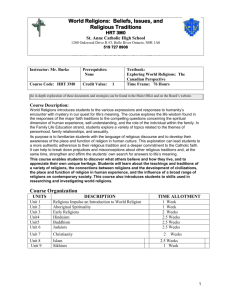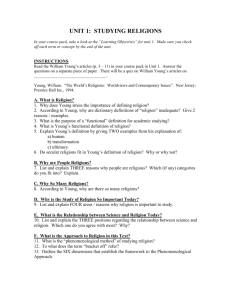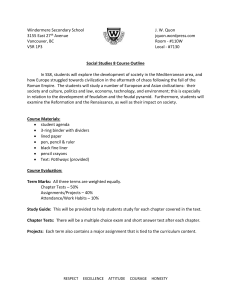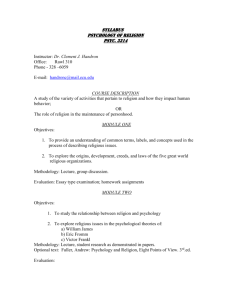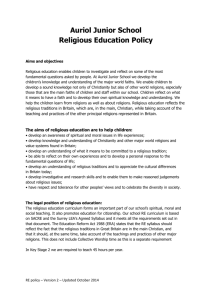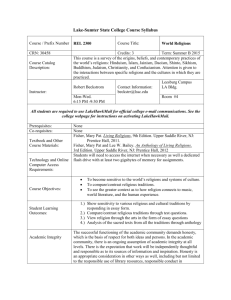Course Organization World Religions: Beliefs, Issues, and World
advertisement
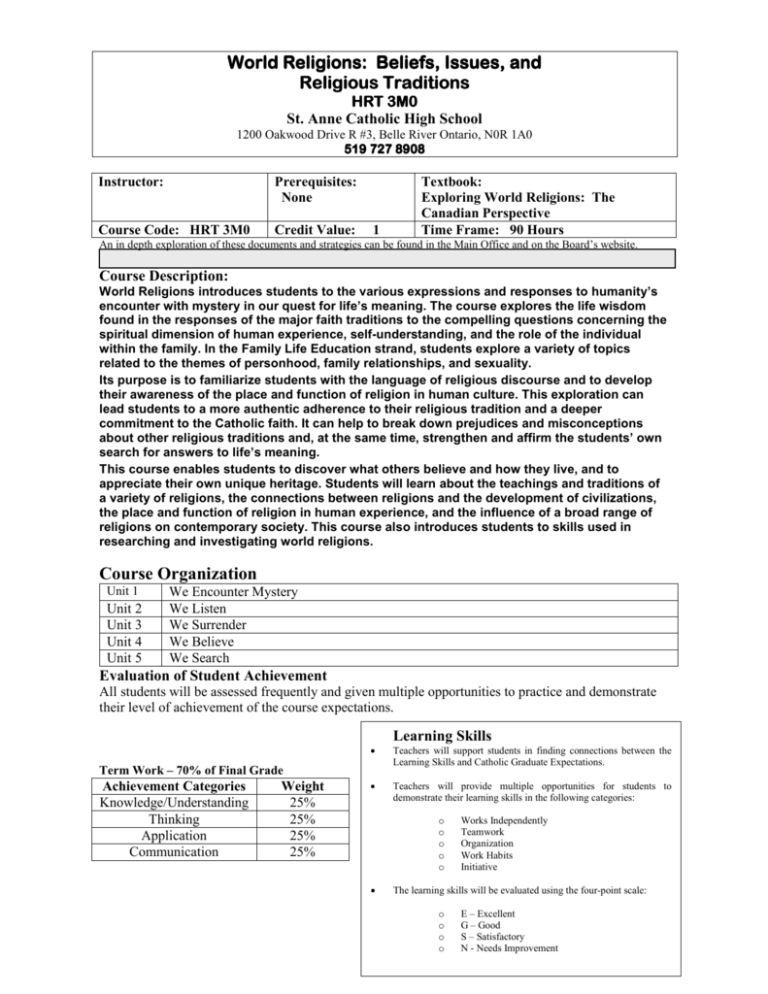
World Religions: Beliefs, Issues, and Religious Traditions Traditions HRT 3M0 St. Anne Catholic High School 1200 Oakwood Drive R #3, Belle River Ontario, N0R 1A0 519 727 8908 Instructor: Prerequisites: None Course Code: HRT 3M0 Credit Value: 1 Textbook: Exploring World Religions: The Canadian Perspective Time Frame: 90 Hours An in depth exploration of these documents and strategies can be found in the Main Office and on the Board’s website. Course Description: World Religions introduces students to the various expressions and responses to humanity’s encounter with mystery in our quest for life’s meaning. The course explores the life wisdom found in the responses of the major faith traditions to the compelling questions concerning the spiritual dimension of human experience, self-understanding, and the role of the individual within the family. In the Family Life Education strand, students explore a variety of topics related to the themes of personhood, family relationships, and sexuality. Its purpose is to familiarize students with the language of religious discourse and to develop their awareness of the place and function of religion in human culture. This exploration can lead students to a more authentic adherence to their religious tradition and a deeper commitment to the Catholic faith. It can help to break down prejudices and misconceptions about other religious traditions and, at the same time, strengthen and affirm the students’ own search for answers to life’s meaning. This course enables students to discover what others believe and how they live, and to appreciate their own unique heritage. Students will learn about the teachings and traditions of a variety of religions, the connections between religions and the development of civilizations, the place and function of religion in human experience, and the influence of a broad range of religions on contemporary society. This course also introduces students to skills used in researching and investigating world religions. Course Organization Unit 1 Unit 2 Unit 3 Unit 4 Unit 5 We Encounter Mystery We Listen We Surrender We Believe We Search Evaluation of Student Achievement All students will be assessed frequently and given multiple opportunities to practice and demonstrate their level of achievement of the course expectations. Learning Skills • Teachers will support students in finding connections between the Learning Skills and Catholic Graduate Expectations. • Teachers will provide multiple opportunities for students to demonstrate their learning skills in the following categories: Term Work – 70% of Final Grade Achievement Categories Knowledge/Understanding Thinking Application Communication Weight 25% 25% 25% 25% o o o o o • Works Independently Teamwork Organization Work Habits Initiative The learning skills will be evaluated using the four-point scale: o o o o E – Excellent G – Good S – Satisfactory N - Needs Improvement 1 Weights Assigned to Term Tasks Tests Quizzes Reflections/Journals Groupwork/Assignments and Mini-Presentation ISU 10% + Exam 20% (Out of 5 2-4 2-4 2-5 Term = 70% 30% Final Evaluation – 30% Practical and Written Exam Key Policies Absence Policy: (School Policy) Students are expected to be present for every test. Generally tests are announced approximately one week in advance. It is the student’s responsibility to account for their absence from a test in the appropriate time and manner. It is the student’s responsibility to make-up the missed test if they are eligible to do so. - In the case of a one day accountable absence (including a school related absence) the student is expected to write the missed test on the first day back following the absence. Tests missed due to an unaccountable absence (i.e. skipping) will receive a mark zero (0). This includes being signed out only for the period of a test. For a test missed due to a prolonged excusable absence the assessment is up to the discretion of the teacher. For a test missed during a first suspension the student will receive a “no mark”. Any tests on subsequent suspensions or a second test on the first lengthy suspension during any course will result in a mark of zero (0). Submission of Late Assignments: • Assignments are due at the beginning of class unless otherwise stated. • If a student submits assignments late, the teacher: (Board Policy) o Must document or track late submissions. Teachers may use the Missed or Late Assignment Student Contract. o Must consult with the student and determine a plan of action to correct this behavior. Teachers may use a variety of methods for dealing with late and missed assignments. o May contact the student’s parent/guardian. o May need to inform Administration or school success team. • Teachers will use their professional judgment when extenuating circumstances arise. • If a student fails to submit a major assignment on time, the student will be given a new due date at the teacher’s discretion. The teacher may use the same assignment or modify the original one. Failure to submit the original/alternate assignment on the second due date may result in a mark of zero. Plagiarism: (Board Policy) If it is determined that a student has plagiarized, the following will happen: • • • • • • The The The The The The plagiarism will be reported to the school administration, student will receive a mark of zero (0), student will be provided an opportunity to resubmit the assignment, first assignment will be recorded in Markbook© as a zero (0), second assignment will also be recorded in Markbook© with the same weight, parent/guardian will be notified and other consequences, including suspension, may be assigned. Class Notes: -Students will require a three-ring binder with 5 dividers to organize notes appropriately -Students should bring text and notebook to class everyday -Homework will be given daily and discussion will reflect the reading in the homework -Students should read the entire chapter during the unit, whether there are homework questions assigned on the reading or not. -Students are encouraged to read the newspaper daily for current applications of justice principles taught and discussed in the course NO electronic devices allowed in the classroom (i-pods, cell phones, mp3's etc) ● 2 Resources: (School Policy) Various films, videos and documentaries reflecting course content Bibles, NRSV Other editions of the World Religions texts may be used as a resource Newspapers and magazines ● ● ● ● PARENT/STUDENT ACKNOWLEDGMENT AND AGREEMENT: _________________________________ Parent/Guardian Signature ____________________ Date __________________________________ Student’s Signature ____________________ Date Textbook # _______ Other Resources Assigned: 3
